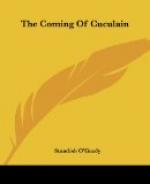is why the Irish have rarely been deeply stirred by
English literature though it is one of the great literatures
of the world. Our history was different and the
evolutionary product was a peculiarity of character,
and the strings of our being vibrate most in ecstasy
when the music evokes ancestral moods or embodies
emotions akin to these. I am not going to argue
the comparative worth of the Gaelic and English tradition.
All I can say is that the traditions of our own country
move us more than the traditions of any other.
Even if there was not essential greatness in them we
would love them for the same reasons which bring back
so many exiles to revisit the haunts of childhood.
But there was essential greatness in that neglected
bardic literature which O’Grady was the first
to reveal in a noble manner. He had the spirit
of an ancient epic poet. He is a comrade of Homer,
his birth delayed in time perhaps that he might renew
for a sophisticated people the elemental simplicity
and hardihood men had when the world was young and
manhood was prized more than any of its parts, more
than thought or beauty or feeling. He has created
for us or rediscovered one figure which looms in the
imagination as a high comrade of Hector, Achilles,
Ulysses, Rama or Yudisthira, as great in spirit as
any. Who could extol enough his Cuculain, that
incarnation of Gaelic chivalry, the fire and gentleness,
the beauty and heroic ardour or the imaginative splendour
of the episodes in his retelling of the ancient story.
There are writers who bewitch us by a magical use
of words, whose lines glitter like jewels, whose effects
are gained by an elaborate art and who deal with the
subtlest emotions. Others again are simple as
an Egyptian image and yet are more impressive and
you remember them less for the sentence than for a
grandiose effect. They are not so much concerned
with the art of words as with the creation of great
images informed with magnificence of spirit. They
are not lesser artists but greater, for there is a
greater art in the simplification of form in the statue
of Memnon than there is in the intricate detail of
a bronze by Benvenuto Cellini. Standish O’Grady
had in his best moments that epic wholeness and simplicity,
and the figure of Cuculain amid his companions of the
Red Branch which he discovered and refashioned for
us is I think the greatest spiritual gift any Irishman
for centuries has given to Ireland.
I know it will be said that this is a scientific age, the world is so full of necessitous life that it is waste of time for young Ireland to brood upon tales of legendary heroes, who fought with enchanters, who harnessed wild fairy horses to magic chariots and who talked with the ancient gods, and that it would be much better for youth to be scientific and practical. Do not believe it, dear Irish boy, dear Irish girl. I know as well as any the economic needs of our people. They must not be overlooked, but keep still in your hearts some desires which might enter Paradise.




